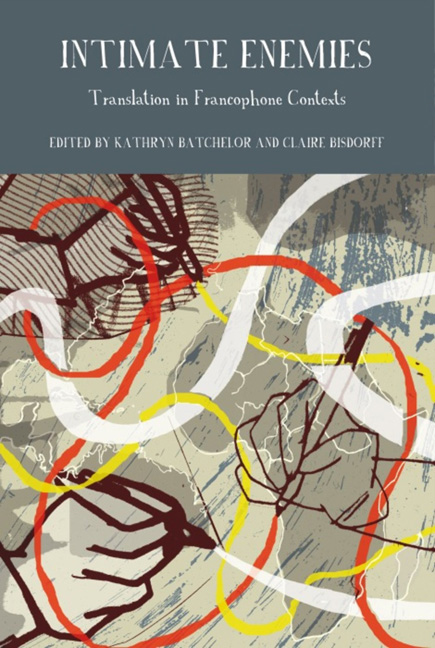Book contents
- Frontmatter
- Contents
- Illustration
- Acknowledgements
- Introduction: Translation – Formidable Enemy or Needed Friend?
- The Translation Market: Publishing and Distribution
- Writing and Translating in Practice
- Translation Challenges and New Avenues in Postcolonial Translation Theory
- Notes on Contributors
- Index
Introduction: Translation – Formidable Enemy or Needed Friend?
- Frontmatter
- Contents
- Illustration
- Acknowledgements
- Introduction: Translation – Formidable Enemy or Needed Friend?
- The Translation Market: Publishing and Distribution
- Writing and Translating in Practice
- Translation Challenges and New Avenues in Postcolonial Translation Theory
- Notes on Contributors
- Index
Summary
Translation: A Labour of Love, and of Listening
The title of this volume, ‘Intimate Enemies’, was originally proposed by Maryse Condé and Richard Philcox as the title for their conversation, which appears in the second section. A husband–wife translator–author duo, Condé and Philcox are perhaps better placed than many to reflect on the intimacies and conflicts that characterize the translation process. Yet their conversation reveals two rather surprising things: firstly, that there is never confrontation between Condé and her translator, and, secondly, that there is no collaboration either, as one might expect given her personal connection to Philcox. Instead, Condé and Philcox's conversation reveals two types of intimacy: firstly, between the author and her text, which Condé describes as being ‘closer than the ties between a mother and her children’. Secondly, between the translator and the original text: Philcox speaks of the translation process as a search not for the apposite word or expression but for the text's voice, music or spirit. The intimacy which characterizes the relationship between author and translator, then, is not a direct but an indirect one, taking place through the text itself. In this respect, Condé's and Philcox's comments offer an interesting echo of Jacques Poulin's novel, La Traduction est une histoire d'amour [Translation is a Love Affair], in which the narrator, herself a translator, cautions: ‘n'allez pas croire qu'il nous suffit de trouver les mots et les phrases qui correspondent le mieux au texte de départ. Il faut aller plus loin, se couler dans l’écriture de l'autre comme un chat se love dans un panier. On doit épouser le style de l'auteur’ (Poulin, 2006: 41).
In this sense, Condé and Philcox's view of translation has much in common with that expounded by Gayatri Spivak (1993: 180), who describes translation as ‘the most intimate act of reading’ involving a ‘love that permits fraying’ (181). Spivak's position is anticipatory of the one put forward in this volume by Marjolijn de Jager, an experienced translator of Francophone African literature. De Jager describes the work of a translator as ‘more than anything else, truly a labour of love’, and stresses the importance of an intimate reading that involves listening, suggesting that ‘language as music requires the strictest possible attention to the ear’.
- Type
- Chapter
- Information
- Intimate EnemiesTranslation in Francophone Contexts, pp. 1 - 14Publisher: Liverpool University PressPrint publication year: 2013

